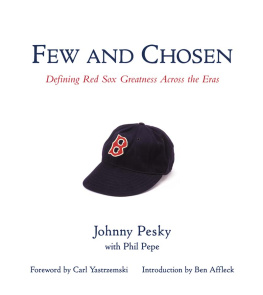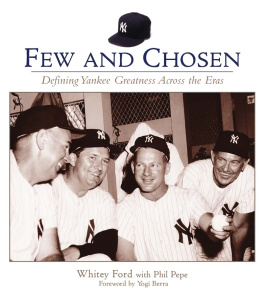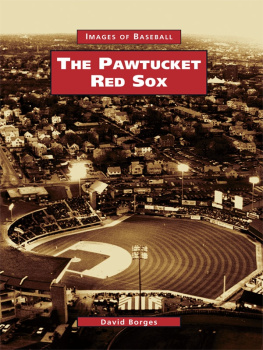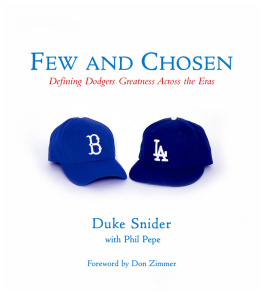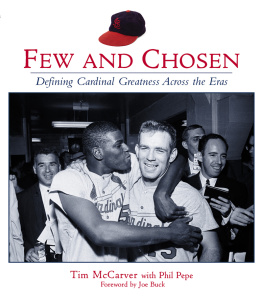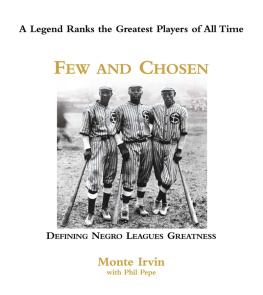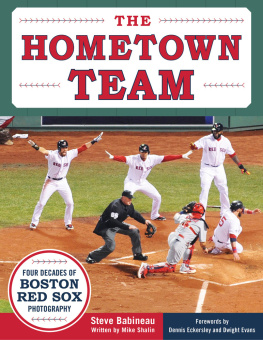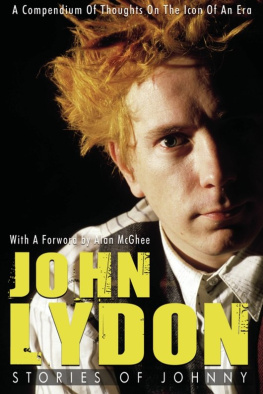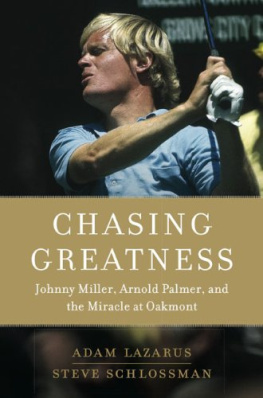This book is dedicated to my dearest friends and teammates, Ted Williams, Bobby Doerr, and Dominic DiMaggio; to my lovely and wonderful wife, Ruthie, who has put up with me for more than 60 years; and to the hundreds of thousands of loyal and patient Red Sox fans who have waited so long to celebrate a World Series victory. Hopefully they will not have to wait much longer.
Copyright 2004 by Johnny Pesky and Phil Pepe
No part of this publication may be reproduced, stored in a retrieval system, or transmitted, in any form by any means, electronic, mechanical, photocopying, or otherwise, without the prior written permission of the publisher, Triumph Books, 601 S. LaSalle St., Suite 500, Chicago, Illinois 60605.
Library of Congress Cataloging-in-Publication Data
Pesky, Johnny, 1919
Few and chosen : defining Red Sox greatness across the eras / Johnny Pesky with Phil Pepe.
p. cm.
Includes index.
ISBN 1-57243-608-5
1. Boston Red Sox (Baseball team)Biography. 2. Boston Red Sox (Baseball team)History. 3. Baseball playersRating ofUnited States. I. Pepe, Phil. II. Title.
GV875.B62P47 2004
796.357640974461dc22
2003063401
This book is available in quantity at special discounts for your group or organization. For further information, contact:
Triumph Books
601 South LaSalle Street
Suite 500
Chicago, Illinois 60605
(312) 939-3330
Fax (312) 663-3557
Printed in United States of America
ISBN 1-57243-608-5
Design by Nick Panos
All photos courtesy of AP/World Wide Photos except where indicated otherwise.

Contents
Index

Foreword
I CAN HARDLY REMEMBER a time when I didnt know Johnny Pesky. When I came to the Red Sox in 1961, he was managing Seattle, their Triple A team in the Pacific Coast League, and I saw him in spring training. Two years later, he came to Boston and was my manager for two years, 196364. Later he would serve as a coach, a broadcaster, an assistant general manager, and again as manager, all with the Red Sox.
Pesky came to Boston 20 years before I arrived, and hes still there 20 years after I retired. Johnnys whole life has been baseball and the Red Sox. He does a tremendous job for the Sox in public relations as a kind of Red Sox ambassadorgoing all over, making appearancesand he still has time to go to spring training every year and to put on the uniform and hit fungoes before home games.
My one regret is that we never found out how good a manager he could have been. In his two seasons as Red Sox manager in the sixties, we werent a very good team and we finished seventh and eighth in the American League. I did win my first batting championship under him in 1963, but I wish I could have done better for him. I wish he could have stayed around long enough to be the manager when the Red Sox got better and that he could have had the opportunity to show the world how good a manager he could have been with better players.
To me, Johnny Pesky is Mr. Red Sox. Hes been there longer than anybody and has been associated with more Red Sox players than anyone else, all the way back to his playing days alongside Ted Williams, Bobby Doerr, Jimmie Foxx, and Dom DiMaggio.
Because of his long association with the team, who better to choose an all-time Red Sox team than Pesky? And because he has been associated with every Red Sox player over the past 60 years, I am honored and flattered that Johnny has seen fit to find a place for me on that team at not one, but three different positions.
I think John has put together a pretty good team, and Id like to make one suggestion. Let Johnny Pesky manage the lineup he has assembled, and then youll see how good a manager he can be.
C ARL Y ASTRZEMSKI

Preface
A S A BOY GROWING UP in Brooklyn, I was consumed by the game of baseball. I had my Dodgers, of course, and I followed them avidly in the newspapers and through the warm, soft, syrupy Southern sound of Red Barber pouring like molasses through my radio. The idols of my youth had names like PeeWee, Dixie, Cookie, and Dolph.
The Dodgers were number one in my young life. I saw my first game in Ebbets Field at the age of six; watched my first no-hitter in 1946, pitched against the Boston Braves in Ebbets Field by a Dodger with the unusual name of Ed Head, who won only two other games that season; and cajoled my aunt Anna to teach me long division before my peers learned it so I could figure out batting averages.
In grammar school, I was introduced to gambling by an Arnold Rothstein in training who financed an elaborate bookmaking operation. Put up 10 cents, pick any three major league players, and if they combined for six hits on any given day, you would get paid back at odds of 31. A return of 30 cents for a dime! A windfall. And it seemed so easy for those of us who scoured the box scores religiously.
Invariably, I would choose the top three hitters in the Boston Red Sox lineup: Dom DiMaggio, Johnny Pesky, and Ted Williams. Occasionally, I would throw in Stan Musial, but never when the Cardinals played the Dodgers because it would be disloyal, and no doubt sinful, to root for Stan the Man to get his customary three hits against my Dodgers. No good could come from the filthy lucre I might have accrued in that fashion.
I felt no disloyalty in picking three members of the Red Sox, who didnt play in the same league as my Dodgers. I suppose if I had a second-favorite team, it was the Red Sox. After all, they wore a B on their cap, similar to that on the Dodgers cap, and they were the fiercest rivals of the hated Yankees, who inflicted so much heartache on my young life. Mainly, I chose the three Red Sox hitters based on sound logic and my superior knowledge of the game that was unmatched by my peers and, no doubt, by any other 11-year-old on the planet.
Williams was Williams, the games greatest hitter, a perennial batting champion who could be counted on to bat .350 or better in any season and get three hits in any game. I had only to hope that the day I selected him in my hit pool wouldnt be the day those cowardly American League pitchers would walk him three times.
I chose Dom DiMaggio, the Little Professor, because as the leadoff hitter on the hit-happy Red Sox, he was almost certain to come to bat five times in any game, six on days the ball was rattling around Fenway Park.
Pesky was chosen because the man was simply a hit machine who was good for two or three hits on any given day. His name told you the kind of menace he was to pitchers. Pesky. It even became part of the baseball lexicon. A pesky hitter.
In 1942, his rookie season, Pesky batted .331 and was second in the league towho else?Ted Williams. Pesky led the league with 205 hits. There was no Rookie of the Year award in those days (it began five years later), but if there were, Johnny Pesky would have easily won it in the American League. Then along came World War II, and Pesky enlisted in the navy, was commissioned an ensign, and missed three of the best years of his baseball career.
He returned in 1946 and batted .335, third in the American League behind Mickey Vernon and Williams, and again led the league in hits with 208, including one stretch in which he had 11 straight hits. He also set an American League record by scoring six runs in a game. In 1947, Pesky again led the league in hits with 207, and his .324 batting average was third in the league to Williams and Barney McCoskey. Whos to say if it were not for the war, Pesky wouldnt have had more than 200 hits in each of his first six major league seasons?
Next page
